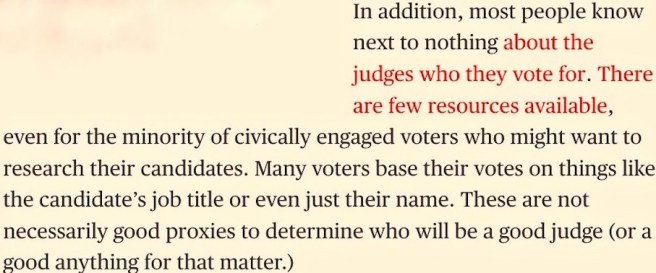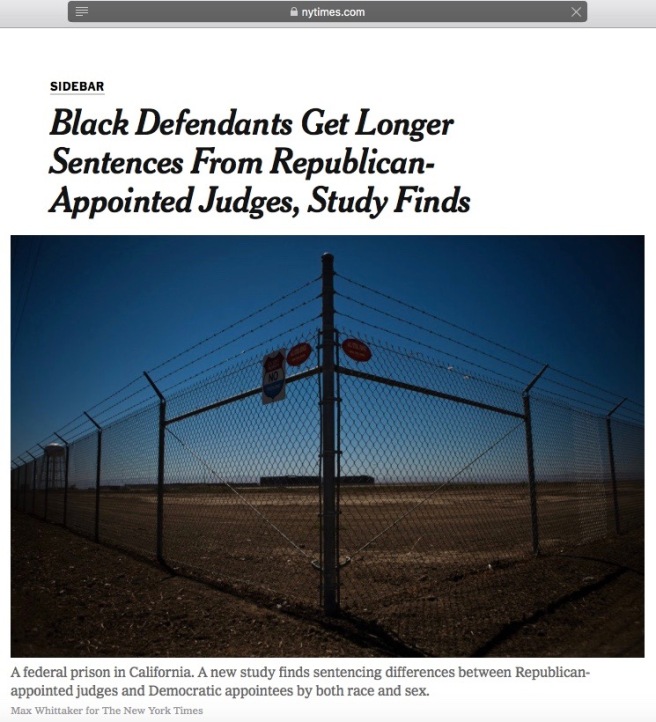

…
Part 1; Part 2; and a new page added on 19 June 2018: ‘Unpublished’ opinions as tools of deceit and lawlessness deployed by courts of appeal
…
In a parable for newspaper reporters about missing the story, probably from the era of figures squinting under green eyeshades at clickety-clack typewriters, an unripe hack returns to the office to tell his editor that he has nothing to fill the space on the front page saved for his review of the new play. Why? Because the theatre, the only one in town, caught on fire just before curtain time and was burnt to the ground.
Deservedly or not, there was a glancing reminder of that legend in the mostly blank screens in all media, where there might have been analysis of the improbable 2018 judges’ election in San Francisco. When the results were announced on the night of 5 June and since then, the few reports on the contest between four sitting judges and their unexpected challengers — four public defenders, poorly-paid lawyers assigned to defendants in criminal cases who cannot afford to hire one — merely recorded that this attempt at a radical shake-up of the bench failed because all the incumbents won enough votes to retain their positions.
Once again, this site — COTIN — found itself agreeing on every point with an attentive Martian observer of the happenings in a conversation that sparked fresh, alarming reminders of the case study featured here :
Martian: Did no one notice that despite the sitting judges’ advantage of years of appearing before their fellow-earthlings in black robes designed to awe and threaten, their victories were not necessarily landslides — less than 70 per cent of the votes cast?
COTIN: Quite so. The most successful winner, Andrew Cheng, defeated his opponent, Phoenix Streets, by a margin of 28 points (64 per cent of the votes). Cynthia Ming-Mei Lee — though she was lucky enough to be the only incumbent with two challengers, who weakened the vote against her — kept her seat with only a 25-point overall margin: 62 per cent of the votes, compared to 27 per cent for Kwixuan Maloof, her more successful rival, and 10 per cent for the other. Curtis Karnow placed a scant 8 points ahead of his challenger, Maria Evangelista (54/46), and Jeffrey Ross won by 19 points over his opponent, Niki Solis (59/40).
Martian: Are elections on Earth supposed to happen like this? None of the challengers did any campaigning, according to our extra-planetary intelligence nerds. None of them even named the judges they were running against, as if they were spectres. Nor did they attack or say a critical word about their records on the bench — though I saw that supporters of the contestant for Curtis Karnow’s seat did all they could to broadcast his history of rulings hostile to rent control.
COTIN: Well, elections are not supposed to have some candidates competing with one arm tied behind their backs — and in this instance, both legs too. But the 2018 San Francisco election is merely one illustration of the strangeness of the American tradition of selecting judges.
Consider another. Nothing in the rules prohibits public defenders from campaigning to unseat and replace judges. But with the election on the horizon, this makes them players challenging referees for their positions while still playing in refereed matches. That is, they have to keep appearing in court as advocates and supplicants, hoping that the judges supporting their fellow-judges will not punish them or exact revenge for being so bold.
Martian: But they were punished publicly, weren’t they? Didn’t you say on COTIN that senior judges and politicians ripped into them after they announced their candidacies?
COTIN: An astounding, savage, spectacle. Yes. The public defenders obviously made their announcement about running jointly because they foresaw correctly that people in high places would be furious that they were exercising their right to compete for judicial offices — as their colleague Matt Gonzalez has recorded in a splendid encapsulation. They joined forces to protect each other. But who’d have thought that the state’s entire legal Establishment — including top-ranking appellate judges who are meant to be shining models of impartiality — would unite and turn on them the way it did?
Martian: The newspaper headlines about this contest were even more astounding. Two, especially — alternatives for the same opinion piece in The Sacramento Bee. One read, ‘Mobs targeting judges will wreck democracy’; the other, ‘Mobs are going after the judiciary this election. Don’t let them corrupt the law.’ What mobs? And where was the guillotine?
COTIN: When you looked under those headlines, all you found was outrage about the challengers emphasising that the four sitting judges were appointed by Republican governors, and that they believed that the bench should have more appointees beholden to a governor from the other party. It was obvious that the public defenders had to concentrate on making just a general point because they dared not risk criticising their opponents as individuals.
But this, along with obliging the judges to seek voters’ permission to stay in office, was framed as ‘politicising’ judicial selection in a system in which judges are usually known publicly as either Democrats or Republicans.
Martian: Yes, and they were accused of threatening judicial independence.
COTIN: Read the American-owned Encyclopaedia Britannica’s excellent entry on judicial independence — which means, essentially, allowing judges to do their jobs without pressure or undue influence from any quarter — and you will be more baffled yet. For a start, it makes it clear that there are two ways to look at any campaign to replace a judge — one of which is that it is a fundamental democratic right in a legal system designed like America’s.

The EB says that ‘it is difficult, if not impossible, to create a perfectly independent judiciary that is completely insulated from all forms of political and popular influence.’ It refers to the history of the increasingly partisan and frankly political U.S. Supreme Court to hammer home that fact.
Readers of the case to which this site is devoted — especially the Treatment of Law section — will be reminded of it in this passage of the EB’s discussion:
[I]f judicial independence is ensured at the individual level, individual judges will find themselves at liberty to pursue their individual preferences. Unchecked discretion of that kind not only invites abuse but also raises the likelihood that judges will decide cases in inconsistent ways, with the potential effect of undermining the predictability and stability of the law.
Martian: So, why didn’t the critics shouting about this 2018 judges’ election destroying judicial independence mention those other dimensions?
COTIN: Why indeed. Members of a profession dedicated to debate pretended that there was only one side to this ideal — that ‘judicial independence’ translates as making judges free to do as they please.
The fuss about independence was a smokescreen. It succeeded brilliantly in diverting attention from what the public defenders were trying to highlight — which is, their belief that San Francisco needs more judges from racial minorities. Not least because members of some minorities make up a staggering majority of the prison population — at least partly because of what the challengers say is racial bias in sentencing.
Martian: Just their opinion, or a substantiated fact?
COTIN: As it happens, it is now well-substantiated — in a new research paper published on 7 May, nearly a whole month before the election. It was featured high up on the home page of The New York Times the week before the judges’ election, in a column by Adam Liptak with a photograph of a California prison. He quoted an authority on sentencing law who said described it as ‘amazing new empirical research’.
But in spite of its critical significance in the judges’ election in San Francisco, it seems — from a trawl through search engines — that only one local newspaper carried any reference to it. Even then, The San Francisco Chronicle did not run its own report about the new research. It republished the one that ran in The Washington Post.
Martian: And the gist of the study’s findings was — ?
COTIN: That the political parties to which judges belong or owe their positions do unquestionably influence sentencing. The Washington Post reporter Christopher Ingraham summarised their conclusion:
Federal judges appointed by Republican presidents give black defendants sentences that are, on average, six to seven months longer than the sentences they give to similar white defendants, according to a new working paper from Alma Cohen and Crystal Yang of the Harvard Law School.
That racial sentencing disparity is about twice as large as the one observed among judges appointed by Democrats, who give black defendants sentences that are three to four months longer than the sentences they give to white defendants with similar histories who commit similar crimes.
[…]
To arrive at these numbers, Cohen and Yang examined over 500,000 sentences handed down by nearly 1,400 federal judges between 1999 and 2015.
Martian: So the Chronicle published a report, but without an editorial or any comment — or reference to the public defenders’ campaign statement and mission? And there was no discussion at all of those findings in San Francisco media?
COTIN: Any reader who finds a record of one will please post a link in the comment box below this post.
There is rarely any talk about the doings of the California judiciary, about which the citizens know far too little to cast their votes for judges. These are judges ferociously resisting any monitoring of their performance and correction.
Their range of tactics for covering their tracks is immense — and has been expanding. Court records are being destroyed by official edict.
Courts of appeal that are meant to vet the sifting of facts and interpretations of law by trial courts objectively not only seem to treat supporting them as a higher goal than impartiality — rubber-stamping their work and decisions whenever possible — but use tricky devices like ‘unpublished opinions’ to hide errors and the actions of some judges disinclined to do their duty and follow the law.
Martian: So that’s why COTIN wants to use the power of the net to put court proceedings online — to let voters see what actually happens there?
COTIN: Why, yes — at the risk of being tiresomely repetitious!
Between roughly a third and half of the San Francisco electorate — those who ignored the sermonising from on high to vote against the incumbent judges — must be ready for justice not merely done but seen to be done, by streaming the process on the net.
Perhaps these voters did that because they — or someone they know well — had the misfortune to seek justice locally and see for themselves that something is truly rotten in parts of the California judiciary.
Martian: Ah, California as the new Denmark? (Where art thou, dear Hamlet?) Let’s hope not …
…
** Alma Cohen and Crystal S. Yang